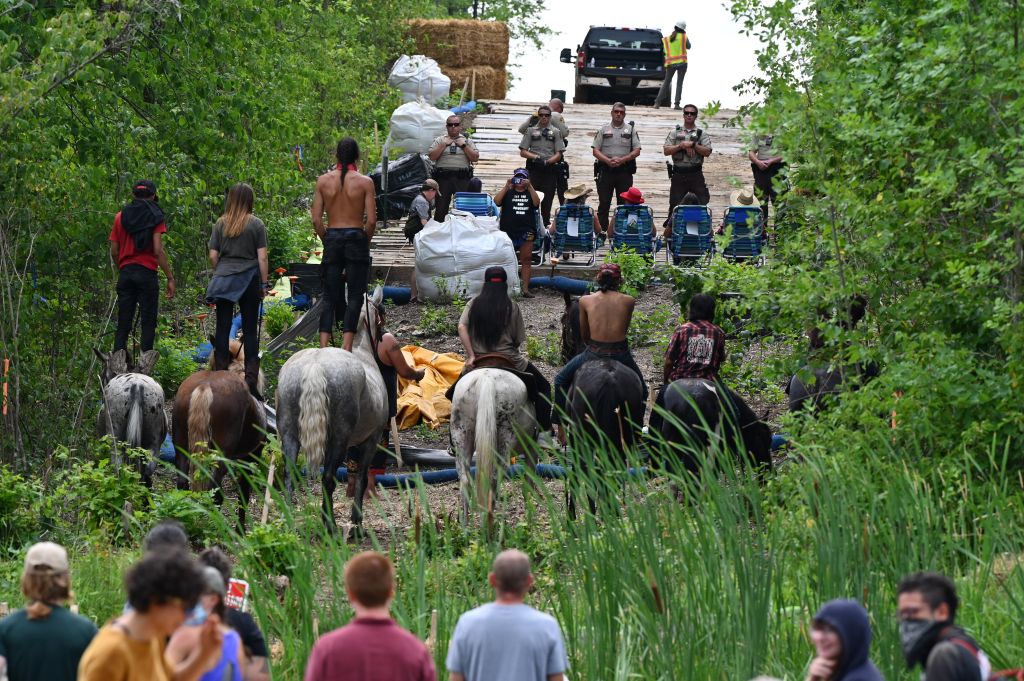“These women represent many others who stand in solidarity with the protection of water across Anishinaabe treaty lands.”
By Jessica Corbett, staff writer for Common Dreams. Published 7-19-2021

Water protectors faced off with police at Shell River in Hubbard County, Minnesota on July 19, 2021.(Photo credit: Sarah LittleRedfeather)
At least seven water protectors from the Indigenous-led movement to stop Enbridge’s Line 3 were arrested on Monday while protesting at the Shell River in Minnesota, which the partially completed tar sands pipeline is set to cross in five places.
“Today women and other water protectors from across multiple communities in Minnesota sat together at the Shell River, near Park Rapids, Minnesota, in peaceful prayer to oppose the construction of Line 3,” the group Honor the Earth said on Instagram. “These women represent many others who stand in solidarity with the protection of water across Anishinaabe treaty lands.”
Honor the Earth executive director Winona LaDuke, one of the Indigenous women leading the fight against Line 3, was among those arrested and zip-tied by officers. According to the group, more than 500 people have been arrested for protesting the Canadian energy company’s effort to replace an old pipeline with lower capacity.
Enbridge doesn’t follow the rules, no agency is regulating their destruction. This is our home, these rivers are our family … Protect the Water …
Come to the Rivers: https://t.co/zvnJVpSzeb #WaterIsLife #StopLine3 https://t.co/R5BCfUTmNi pic.twitter.com/2sEc9KpGO5— Honor the Earth (@HonorTheEarth) July 19, 2021
The Minnesota Department of Natural Resources (DNR) has temporarily suspended some surface water-related permits for Line 3 in response to ongoing drought conditions in the state.
As Minnesota-based Bring Me The News reported Monday:
Starting July 15, Enbridge’s water sources within the Crow Wing River, St. Louis River, Pine River, and Mississippi River-Brainerd watersheds are suspended. This suspension impacts 10 water sources used in dust control, and 13 water sources used in [hydrostatic testing and horizontal directional drilling].
That includes along the Shell River, where the group Honor the Earth said more than 40 water protectors were on the scene Monday.
Last Thursday, about 200 people—including LaDuke and actor Marisa Tomei—gathered at the Shell River for a “Women for the Rivers” event.
“A society that permits violence on water and violence on women is a society we stand to change,” LaDuke said ahead of the gathering last week. “Together on Thursday we will practice treaty rights and rally at the Shell River, where the Enbridge corporation is preparing to drill for the dangerous Line 3 tar sands pipeline—just one of 22 river crossings Line 3 will cross, including the Mississippi River twice! As Enbridge builds Line 3 through Anishinaabe treaty land, we continue to stand strong in our resistance.”
The Duluth News Tribune reported that Tomei, during Thursday’s event, took aim at President Joe Biden, who ran for office promising to combat the climate emergency.
“It’s time to stop playing politics with the future of life on this planet,” Tomei said. “If President Biden is serious about climate change, if he’s serious about respecting the rights of Indigenous people, and if he’s serious about making sure we’re on track to have a livable planet then Line 3 must be stopped.”
Thank you to @marisatomei for traveling to the Shell River, meeting with water protectors, and calling on @POTUS @JoeBiden and @ginamccarthy46 to #stopline3. pic.twitter.com/dzi9C25UBN
— Honor the Earth (@HonorTheEarth) July 16, 2021
Earlier this month, more than 200 activists, celebrities, Democratic donors, and environmentalists sent a letter demanding that Biden stop Enbridge’s pipeline project—like he did with Keystone XL on his first day in office—and to “firmly establish the principle that we will move forward toward real climate solutions.”
That letter came after the Biden administration infuriated opponents of Line 3 last month by filing a legal brief in support of the U.S. Army Corps of Engineers’ approval of the project under former President Donald Trump.
Biden’s refusal so far to intervene on Line 3 has not deterred the pipeline’s critics from continuing to fight against it in court and on the ground with peaceful acts of civil disobedience that have, at times, halted construction.
Actions opposing Line 3 have been met with force by local police—who, due to a state requirement for the project’s approval, have sometimes been reimbursed for policing protests with money from Enbridge.
As Common Dreams reported last week, LaDuke and others filed suit against Minnesota’s Hubbard County, the sheriff, and the local land commissioner for a police blockade of an Indigenous-led resistance camp located on private property.
Mara Verheyden-Hilliard, one of the attorneys representing the plaintiffs, said that “the Hubbard County Sheriff has attempted to illegally construct a de facto open-air prison to trap Indigenous environmental protectors and allies on their own property and to prevent others from joining in decolonization and treaty rights trainings and organizing against Enbridge’s Line 3 pipeline.”
The banks funding Line 3 are also under pressure from Indigenous and climate leaders, who held events over the weekend targeting the financial institutions.
Powerful to see all of the #StopLine3 actions happening across the country! https://t.co/fFT4GLT8KY
— Resist Line 3 (@ResistLine3) July 18, 2021
Thank you Bay Area! #DefundLine3 https://t.co/iEXhED9ZTy
— Stop the Money Pipeline (@StopMoneyPipe) July 16, 2021
“Stopping Line 3 is a matter of justice,” says Stop the Money Pipeline on its webpage dedicated to the project, which features resources to contact banks and support protesters.
“Steady direct action resistance forms cracks in the world of profit margins. As we learned at Standing Rock, Indigenous land defense poses a deep reputational risk to the financial institutions profiting from oil pipelines,” the site says. “Activists all over the world are taking action to support the work on the ground—join the fight against Line 3 and together we can stop this toxic pipeline.”

